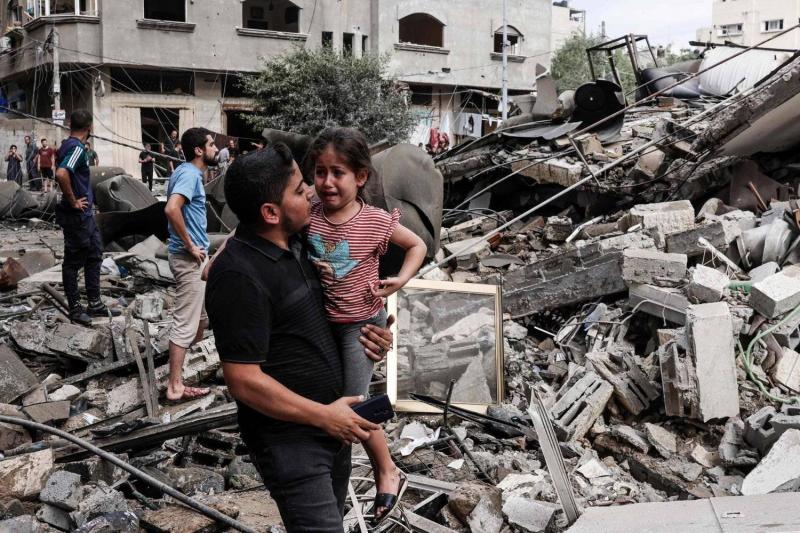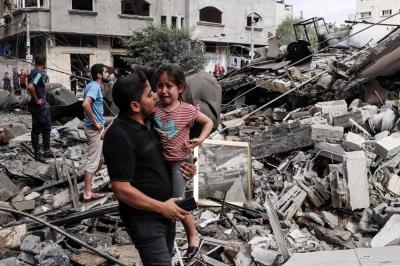The number of residents in the Gaza Strip reported killed during the ongoing Israeli war for the past 10 weeks has surpassed the death toll in any Arab conflict with Israel in over 40 years, and perhaps any conflict since the establishment of the State of Israel in 1948. The Gaza Health Ministry announced on Thursday that the death toll has exceeded 20,000, making it higher than one of the most reliable estimates of casualties in Lebanon following the Israeli invasion in 1982. While officials in Gaza have stated that counting the dead has become an increasing challenge, most experts believe the reported figures are likely lower than the actual number and express shock at the magnitude of the loss.
Some military experts indicated that the death toll in this war has been faster than the casualties during the bloodiest phases of the U.S.-led wars in Afghanistan or Iraq. Azmi Keshawi, a Gaza affairs analyst at the International Crisis Group, stated that this war has been "more horrific" than any war he has witnessed before. He mentioned that he and his family fled their home in northern Gaza and moved six times so far, and they currently live in a tent near a United Nations shelter in the southern city of Rafah.
The Israeli army is conducting an intensive aerial and ground campaign to eliminate Hamas, the armed Palestinian group that governs Gaza and led the attack on October 7, which officials say resulted in the deaths of around 1,200 people in Israel, including hundreds of soldiers. The rising casualty numbers reflect how Israel has chosen to wage war using thousands of airstrikes, heavy bombs, and artillery in a small area densely populated with civilians who cannot flee. Israel claims that Hamas built a vast network of tunnels underground to protect its fighters and weapons, placing civilian infrastructure and people in the line of fire.
This recent war between Israel and Hamas is believed to be the deadliest conflict for Palestinians since Israel was founded 75 years ago. According to the Palestinian Central Bureau of Statistics, around 15,000 Palestinians were killed during the war that followed the establishment of Israel in 1948. If the figures coming from Gaza are accurate, the deaths in the current conflict have also surpassed the most cited estimates for casualties during the first three months of the Lebanon invasion in 1982. However, as is the case in today's Gaza, researchers say the death toll in Lebanon may never be known for certain due to the fog of war, even four decades later. This estimate comes from analyzing police and hospital records from 1982, which estimated the death toll to be around 17,825. However, it was reported that this number was likely lower than the actual count, and in 1982, the New York Times stated that "accurately counting the dead is practically impossible" in Lebanon.
During the 1967 Middle East War, it was estimated that about 19,000 Egyptians, Syrians, and others died fighting against Israel, while a similar number—mostly Syrians and Egyptians—died in the 1973 war. Like the death toll in the wars in Gaza and Lebanon, those numbers are also unknown but are believed to consist mostly of fighters. In contrast, the Gaza Health Ministry, part of the Hamas-run government in the territory, announced on Wednesday that about 70 percent of those killed are women and children. Authorities in Gaza do not provide information on the number of combatant deaths. The ministry reported on Thursday that the death toll had reached 20,057.
Israel claims it has killed around 7,000 Hamas fighters but has not clarified how this number was determined. The death toll in Gaza is expected to rise significantly as Palestinians are able to recover bodies amidst the massive destruction caused by the war. A spokesman for the Gaza government stated on Wednesday that, in addition to the dead, there are 6,700 people missing, many of whom are believed to still be trapped under the rubble. Omar Shakir, the director of Human Rights Watch in Israel and Palestine, said, "It is likely that many of the missing under the rubble have died," adding that for this reason, "the death toll is likely to rise even if bombing were to stop today." No independent organization has been able to verify the death toll in Gaza due to difficulties working in the territory. As the conflict continues, collecting casualty figures has become more challenging.
The Gaza Health Ministry compiles death toll data from local hospital and morgue records, according to officials in the region. However, in recent weeks, the government media office reported that it intervened to help gather numbers after airstrikes hit health ministry facilities, with 27 out of 36 hospitals in Gaza rendered inoperable due to bombings amid an Israeli blockade that has severely restricted the entry of food, water, fuel, and medicine. Frequent communication outages caused by Israeli strikes on communication towers, along with Israeli control over communication lines in the territory and fuel shortages, have made information gathering extremely difficult. Mahmoud Al-Farra, a spokesman for the government media office, stated that those collecting data have to make the most of "the available resources" amid the fighting, noting, "It's hard to count the dead because the number of martyrs is large."
Throughout the war, the Gaza Health Ministry has issued updated death toll numbers that have been widely regarded as reliable by the United Nations, humanitarian organizations, and a study published this month in the British medical journal The Lancet. This month, when the ministry announced that the death toll had surpassed 15,000, some Israeli officials said they believed this figure was almost accurate. However, the Israeli army also stated that the death toll reported from Gaza cannot be trusted because the area is controlled by Hamas. On October 26, the ministry released a list of names and identification numbers for 6,747 people it said had been killed up to that moment due to Israeli bombings—a count that reinforced the credibility of these figures.
Ahmad Fouad Al-Khatib, a staunch critic of Hamas who grew up in Gaza but now lives in California, stated that Israeli airstrikes have so far killed over 30 members of his family, including people in their seventies and cousins aged between 3 months and 9 years. He recounted that early in the war, his childhood home was bombed, resulting in the death of a cousin. Last week, his aunt and uncle's home was bombed, resulting in the deaths of at least 31 people. While sitting in California, he watched a video on his phone of their destroyed home, adding that none of those individuals were affiliated or connected to Hamas. "It was a family home," he remarked.




